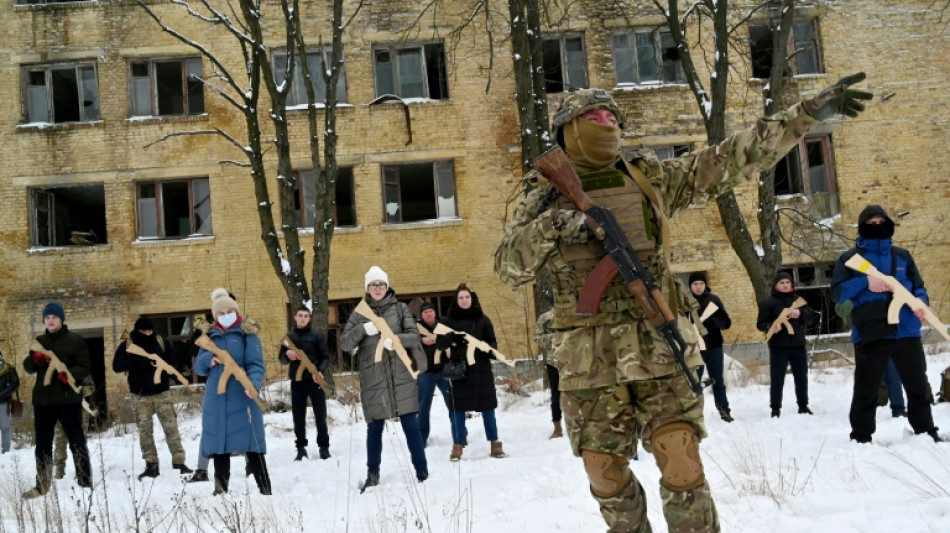

Russia, US clash at UN over Ukraine crisis as oligarchs threatened
Russia and the United States clashed over Ukraine at the UN Security Council Monday, as London and Washington threatened to slap sanctions on wealthy Russian oligarchs if the ex-Soviet state is attacked.
French leader Emmanuel Macron and Russian President Vladimir Putin spoke by phone for the second time in four days amid intense efforts by NATO allies to deter a Russian invasion of Ukraine.
With more than 100,000 Russian troops massed on its neighbor's borders, tensions soared as US Ambassador Linda Thomas-Greenfield told the Council that Moscow is planning to increase its force in Belarus six-fold in the coming days.
"We've seen evidence that Russia intends to expand that presence to more than 30,000 troops near the Belarus-Ukraine border, less than two hours north of Kyiv by early February," said Thomas-Greenfield.
"If Russia further invades Ukraine, none of us will be able to say we didn't see it coming, and the consequences will be horrific."
- 'Hysterics' -
But Russia's ambassador to the UN, Vassily Nebenzia, rejected the allegations and said Washington was engaging "in hysterics" by calling the Council meeting on Ukraine.
He said no Russian official had threatened to invade the former Soviet republic and that Ukrainians were being "brainwashed" by the "Russiaphobia" of the West.
And he said that the troops in Belarus were there for joint exercises.
The United States is "whipping up tensions and rhetoric and provoking escalation," Nebenzia said.
"The discussions about a threat of war is provocative in and of itself. You are almost calling for this, you want it to happen," he charged.
- Russia isolated at UN -
Russia has repeatedly denied it poses a threat to Ukraine, while demanding guarantees that Kyiv will not join the US-led NATO alliance and that the United States will not establish new military bases in ex-Soviet countries.
Macron and Putin exchanged their views on the situation "as well as issues related to providing Russia with long-term and legally-binding security guarantees," the Kremlin said in a statement after their call.
The French presidency did not provide details on the content of their discussion, but it came one day before US Secretary of State Antony Blinken is to hold fresh talks with his Russian counterpart Sergei Lavrov.
Russia found little support on the 15-member Council as it pushed back against allegations its troop presence on the Ukraine border was an implicit threat.
It had tried to block the meeting from taking place, but ten members voted to proceed with debate and three abstained, leaving Moscow isolated.
"This is the largest... mobilization of troops in Europe in decades," Thomas-Greenfield said.
"And as we speak, Russia is sending even more forces and arms to join them."
Ukraine's ambassador to the UN, Sergiy Kyslytsya, called for de-escalation so talks can resume over the conflict already ongoing inside Ukraine with pro-Moscow secessionists in the eastern Donbass region.
"My president has reiterated most recently that he's ready to meet his Russian counterpart," Kyslytsya told the Council.
"If Russia has any questions to Ukraine, it is better to meet and talk, not to bring troops to the Ukrainian borders and intimidate Ukrainian people," he said.
"For Ukraine, the first priority today is to achieve a sustainable and unconditional ceasefire in Donbass."
- Oligarchs under threat -
Meanwhile, Britain and Washington signaled that the billionaire oligarchs around Putin would be hit with sanctions in case of an invasion.
British Foreign Secretary Liz Truss told parliament that the government was putting through "the toughest sanctions regime against Russia we've ever had."
"Those in and around the Kremlin will have nowhere to hide," she said.
She would not name names, but on Sunday indicated that the powerful business allies of the Kremlin, many of whom have sizable business and personal assets in Britain, were in the crosshairs.
"There will be nowhere to hide for Putin's oligarchs," Truss told Sky News.
White House spokesperson Jen Psaki also signaled that Washington has its eye on the same class of people for possible sanctions.
"The individuals we've identified are in or near the inner circle of the Kremlin and play a role in government decision-making," Psaki told reporters Monday.
"We have developed specific sanctions packages for both Russian elites and their family members."
The Kremlin denounced Britain's move as an "undisguised attack on business," charging that "the Anglo-Saxons are massively ramping up tensions on the European continent."
T.Zangari--IM




